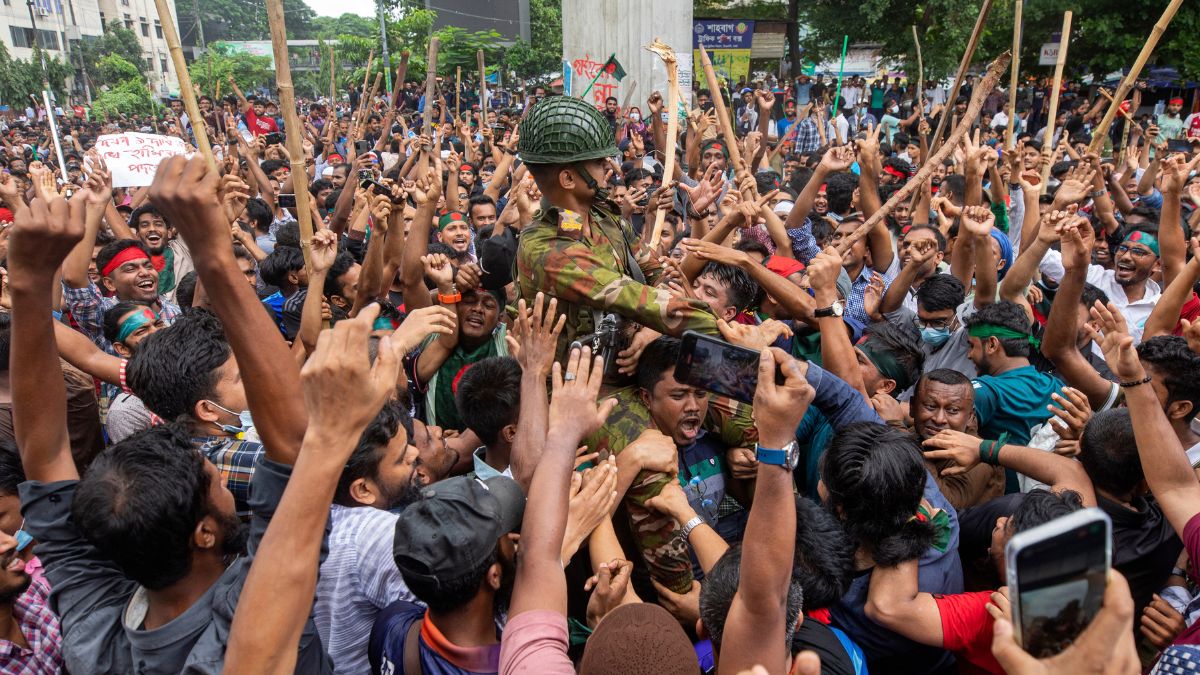Hasina fled the country for India on Aug. 5 after a violent uprising against her led to nearly 300 people getting killed, including many students. She has been named in two murder cases already, along with senior members of her cabinet. read more
)
Protesters carry a member of the army on their shoulders as they celebrate Prime Minister Sheikh Hasina's resignation, in Dhaka, Bangladesh, Monday, Aug. 5, 2024. File Image- AP
De-facto foreign minister, Mohammad Touhid Hossain said that Bangladesh is considering whether to request India to extradite the former Prime Minister Sheikh Hasina as legal cases including murder charges continue to mount against her.
In an interview on Thursday, Hossain mentioned that while he did not want to speculate, Hasina is now facing “numerous cases.” Should the country’s home and law ministries decide, Bangladesh may need to request her “return to Bangladesh,” he said.
Hossain said that such a request could pose a diplomatic challenge for the Indian government, adding that India is aware of the situation and he is confident they will handle it appropriately. He did not provide further details.
Hasina, who resigned and fled to New Delhi after protests in the country turned violent, resulting in the deaths of hundreds, is now facing “numerous cases.”
Meanwhile, Ataur Rahman, deputy director of the International Crimes Tribunal’s investigation cell said that a third case has been launched, investigating ten individuals, including Hasina, for murder, torture, and genocide committed during the protests.
At least three of Hasina’s former ministers and advisers have already been arrested in Bangladesh.
In her only statement since her ouster, Hasina has demanded a probe into the killings and vandalism during the protests. She has not commented on the charges against her.
Hossain, a retired diplomat, is the adviser on foreign affairs in the interim government led by Nobel laureate Mohammed Yunus, which was sworn in last week after Hasina’s ouster. The council of advisers includes other retired officials, lawyers, student leaders of the protests and some opposition politicians.
ROHINGYA REFUGEES
In his first interview to international media since taking over, Hossain said Yunus is ”very unhappy about the way the statements are coming from India, from the former prime minister” and he conveyed this to the Indian envoy in a meeting on Wednesday.
Hossain also asked India, and other countries, to take in more Rohingya refugees from Myanmar, as Bangladesh was not in a position to accept any more.
Hossain said other countries need to put pressure on the Arakan Army rebel group in Myanmar to ”ensure this does not happen”, referring to attacks on Rohingyas in their native Rakhine state.
”The world community has to create a situation that they (the Rohingya) can go back,” he said.
The Arakan Army, an ethnic rebel militia in Rakhine state, is fighting the Myanmar junta which overthrew the civil government in 2021. Both sides in the conflict have attacked Rohingya settlements.
Dozens of Rohingyas were killed while fleeing Rakhine this week, the latest episode of violence against the persecuted Muslim minority in Buddhist majority-Myanmar. Over 730,000 of them fled to Bangladesh in 2017 after a military-led crackdown that the U.N. said was carried out with genocidal intent.
”It is a humanitarian issue that involves the entire world, not only Bangladesh. We have done more than our share,” Hossain said.
He added that Dhaka wants good ties with everyone, including India, China and the U.S.
Discussing possible elections in Bangladesh, the adviser said that there will be more clarity on the timeline by September.
”Because everyone, all my colleagues in the council of advisers, they are extremely busy with bringing back normalcy” which should be restored by early September, he said.
He said the interim’s government priority is to bring ”irreversible” reforms, ”because our system has been thoroughly corrupted and the institutions have been destroyed and they have to be restored.”
Once elections are announced, he said, ”we fade away”, referring to senior members of the interim government.
”None of us have any political ambitions.”
With inputs from agencies.

 1 month ago
31
1 month ago
31
)
)
)
)
)
)
)
)
)
)
)
)
)
)
)
)
)
)
)
)
)
)
)
)
)
 English (US) ·
English (US) ·